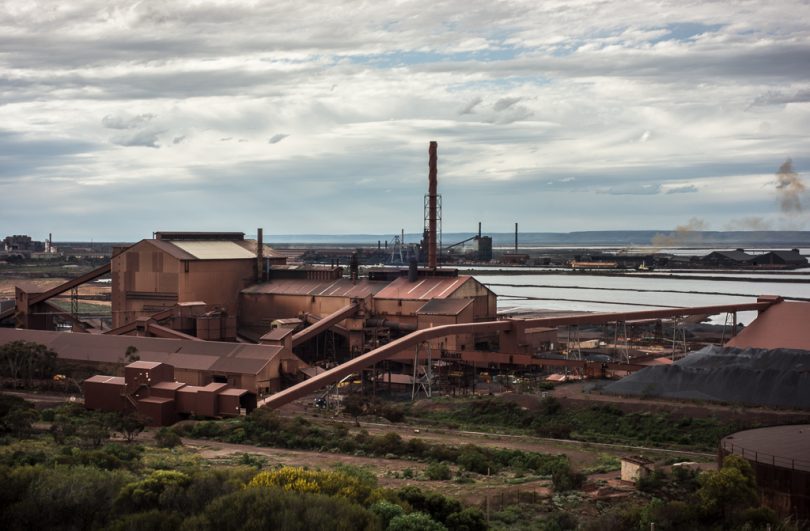For a city of just under 22,000 people, Whyalla has received an abnormal amount of national attention in the past decade.
In 2012, then-Opposition Leader Tony Abbott said the city, driven by steel production, would be “wiped off the map” as a result of the Gillard Government’s short-lived carbon tax.
Labor’s Trade Minister Craig Emerson famously mocked Abbott’s comments in a press interview, “perfoming” (in the loosest definition of the word) a version of the Skyhooks 1975 hit song Horror Movie. “No Whyalla wipe-out there on my TV,” he sang, in a clip that has to be seen to be believed.
The following year Abbott was elected Prime Minister and later repealed the carbon tax, but it didn’t stop Whyalla from facing the threat of a wipe-out.
In 2016, Arrium, the owners of the city’s steelworks, entered voluntary administration with debts of over $4 billion. An integral part of Whyalla’s economy and identity for generations, this placed over 3,000 jobs in jeopardy and threatened to destroy the livelihood of so many.
Dylan Smith, former editor of The Whyalla News, says the news hit hard. The newspaper was first printed in 1940 but had never experienced anything like the potential of the city’s number one industry abruptly ending.
“The fallout when Arrium collapsed in Whyalla was one of the biggest stories I covered in my time in the Spencer Gulf,” he said.
“That and the Nyrstar transformation of the Port Pirie smelter as well as when the power station in Port Augusta collapsed. There was also the Royal visit.”
As has become customary in regional areas, Smith oversaw a collection of newspapers as a decline in circulation and advertising led to staff job cuts. By the end of his reign as editor, his collection resembled a mini media empire.
“I worked as an editor from about 2012 onwards, I was the head of a paper, and then my role over the years transformed. As we went into restructure, I gathered more papers and in the end, I was managing six newspapers,” he said.
“When I left in December last year, I’d probably say the Whyalla News was more dire than the rest. Of the cities we covered, Whyalla was the largest city, so people didn’t feel quite as connected to the paper as in a smaller city like Port Pirie.”
Exacerbating the battle in the Spencer Gulf Region was competition with the local television channel, a Seven Network affiliate that produces its own local news service.
“In Whyalla, the competition with the local TV news service was relatively fierce. We found it particularly challenging in Whyalla and Port Augusta, only because the people that we had based on those papers weren’t locals.”
In a region as sparse and remote as the Spencer Gulf, Smith says it was difficult to fill positions at his newspapers, with a severe lack of local journalists and apprehension from university graduates to make the journey to regional areas. The connection to the local community and quality of content, particularly in Whyalla, suffered as a result.
“Trying to get people fresh out of university is probably one of the biggest challenges country newspapers have faced in a long time. The last few years it has been particularly challenging,” he said.
“Local connections make a world of difference at local papers. In Port Pirie, we often know the stories that people want to read and we often have an inside scoop about what’s happening in the community. For me, covering for the Whyalla News, along with my Whyalla journalist who wasn’t from Whyalla, keeping your finger on the pulse was a much bigger challenge.”

Whyalla’s main strip. Credit – denisbin on Flickr Creative Commons
While the paper’s connection to the people of Whyalla may not be as strong as in Port Pirie, Smith says Australian Community Media’s decision to stop printing the bi-weekly is still a big loss for a city which has faced plenty of challenges in recent years.
“I think it’s particularly damaging for the older generations. I think a lot of elderly people are more isolated now than other members of the community. They’d probably look for a local paper to read just as a way of reading things that are uplifting to take their minds off the crazy things that are happening,” he said.
“I’d say people in the Spencer Gulf, and country towns in general, primarily get their news from the papers. When someone picks up a country paper, chances are people flicking through the paper would recognise a lot of people who are on the pages. People are buying country papers looking for that connection, whereas people in cities aren’t reading it for that. That relationship is different.”
Whether the paper resumes printing or not is a decision not expected to be made in the near future. Smith says it’ll be difficult to start from ground zero but that a permanent move to digital is just not an option.
“It’ll be challenging for the papers to restart after such a large hiatus. I can’t see a move to digital full time, it wouldn’t be feasible at all. For country papers at the end of the day, what pays the bills still is print papers, so that’s why it’s crucial for print papers to come back in their full form whenever they can. I think there’s still a need in a lot of these small communities for a print product.”
Whyalla’s steelworks survived the threat of extinction when their workers voluntarily took a 10% pay cut, attracting Englishman Sanjeev Gupta to the town and task of turning the plant around. Gupta’s investment has turned the city from a potential ghost town to a city with a bright future. The local council anticipates the economic growth associated with the mill will see the population of Whyalla will swell to 80,000 in the next 10 to 20 years.
Recent announcements of a foreshore hotel and ‘Next-Gen’ mega steel plant led the city back into the national spotlight, with Prime Minister Scott Morrison calling Whyalla the “comeback city of Australia”.
A city with the heart, determination and belief of Whyalla deserves a thriving newspaper, and if any city can bring something back from the dead, it’s Whyalla.


